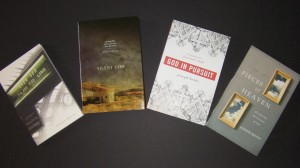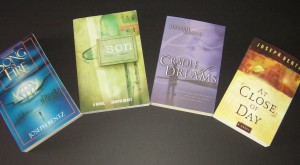I have written four novels and four non-fiction books. People have often asked me which
type of book I prefer to write. I recently read an article in the New York Times in which novelist and non-fiction writer Sally Koslow answered that question about her own writing. She wrote, “While I’m writing, whatever genre I’m committed to becomes my favorite.”
For me, it’s just the opposite. Whenever I’m working on a novel, I am certain that it was never this hard doing a non-fiction book. When I’m working on non-fiction, I long for the luxury of getting lost in the fictional world.
Ultimately, which one do I prefer?
Here are some differences to consider:
1. One of the joys of writing fiction is that I get absorbed in the world of the novel during the months or years that I am working on it, even during the hours when I’m away from the work and doing other things. The events of the book keep swirling through my brain throughout the day, and no matter what I’m doing—walking across campus, eating dinner, watching TV, I am likely to have a scene start playing in my head or bits of dialogue come to mind that demand to be written down. Non-fiction books don’t take over my brain in quite the same way. Even though the non-fiction book is often on my mind, it remains at a bit more of a distance when I’m not working on it.

When I am writing a non-fiction book, everything I see and hear, from articles and Facebook posts to conversations with friends, seems to connect to the book's big idea.
2. One of the pleasures of working on a non-fiction book is that while I’m writing it, everything I see, read and hear seems to connect itself to the book’s big idea. If you have ever bought a car and then suddenly noticed lots of those same types of cars everywhere you go, then you know the kind of thing I’m talking about. Once I get going on a book, I suddenly see aspects of my idea everywhere—in news articles, Facebook posts, conversations with friends, pastors’ sermons, TV shows, songs on the radio, and lots of other places. I love collecting all these ideas and trying to make sense of it all.
3. It’s harder for me to sustain my writing momentum when I’m writing a novel. The world of it is more fragile. When I’m writing a novel, I have to work on it every day in order to sustain the forward motion of it. That is not so true with non-fiction. I can be away from my non-fiction book for a few days and easily pick up where I left off. It will eventually grow cold if I set aside for too long, but short pauses in working on it are not as disruptive as they can be for a novel.
4. Some people assume writing fiction is easier because the novelist can simply “make it all up” and write whatever he or she wants. Novelists know it doesn’t work that way. The world of the novel must be internally consistent, and I have to make endless choices about points of view, when to reveal things, what to leave out, what to dramatize, what to summarize, where to begin, where to end, and so on. Writing a novel is not simply “telling a story” as many people think of it. It is a carefully constructed puzzle, often structurally more complex than a work of non-fiction.
So which one do I prefer? I am tempted to take the easy way out and say that I can’t choose because I love them both. But if pressed, I would have to say that ultimately, I would rather write a novel.
Of course, I am arriving at that conclusion at a time when I am under contract for a new non-fiction book and am hard at work on it every day…

Comments 5
This is a good blog and I enjoy both. But I spent a number of years writing short stories and columns
for a magazine, books and other publications. These
were non-fiction. When my first novel was released, I couldn’t wait to keep writing fiction. I really enjoy it, and am addicted to it. 🙂
This is really interesting, Dr. B. I have only written non-fiction, but am beginning to dabble in fiction. I find that I am more scared to start fiction; with non-fiction, I feel like less risk is required. Although it takes courage to present non-fiction because vulnerability is required, I feel that the author has a safety net of, “Well, that was my experience” if the reader doesn’t take to it. However, when one writes fiction and if readers do not care for it, all the author is left with is the failure of his or her imagination! Yikes.
Interesting points. For me, I find writing fiction banal, but reading fiction extremely thrilling for the same reasons you enjoy writing it–I long to get lost in a world of pretend, taking me someplace else to escape whatever life is throwing at me in the present time. However, I adore writing nonfiction but despise reading nonfiction. The challenge of creating a creative nonfiction piece is absorbing, and it comes easy to me (the fluidity of the story-telling alone is enticing), but reading a creative nonfiction piece makes me wonder, “why can’t you just make it more interesting and call it a fiction piece? where’s the line between nonfiction and fiction? you aren’t creative enough to just write a fiction piece?” I inherently throw myself under the bus because all I write are creative nonfiction pieces.
Dr. Bentz,
I’ve written both non-fiction and fiction and can honestly say, non-fiction scares the crap out of me. The reason being is stems from an experience I had with an academy award nominated documentary director. Her name is Leslie Iwerks. She made a documentary about a garbage dump in Guatemala called “Recycled Life”. This doc touched on a woman who was responsible, as a newly grad student, for creating a home for many children that lived in this dump and opened her own school there. I was in charge of putting together an outline and treatment for a book that was going to be written on her life. I had the honor and privilege of looking through her diaries, notes, postcards, pictures, documents, and pretty much anything you can think of. Well, this honorable woman died a few years ago in a car accident. The reason I say that non-fiction scares me is because as an author, you are responsible for the truth and the honest truth. I felt this huge responsibility and felt as though I didn’t deserve to write this person’s life because I didn’t want to mess it up. It was her life and she lived it to the fullest, how could I condense it into a book? I think it’s something that would take practice, but as much as it scares me, it was a real honor to work on this project and pay tribute to an incredible lady.
As a fiction lover and writer, I personally don’t find any appeal in non-fiction. It’s not that I think non-fiction is gross or anything, but that non-fiction written by me isn’t very fun. I’d always have a hard time talking about my summer or my weekend whenever my teachers would ask me about it, because I’d much rather talk about interesting things.
It’s funny–if I write a non-fiction work on my own life, I find it to be really boring. However, if I decide to fictionalize it (even if most of the events remain mostly the same) I feel much freer and happier. This could be, however, because I don’t know much about how to do creative non-fiction.
While we are on this subject, I did plan on writing a non-fiction work about the history of my Cuban family.I hope that doesn’t end up actually being a pain!